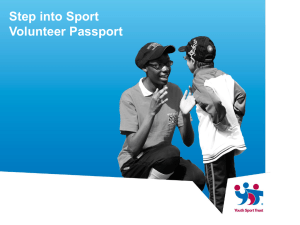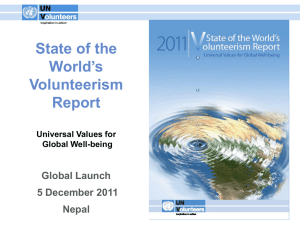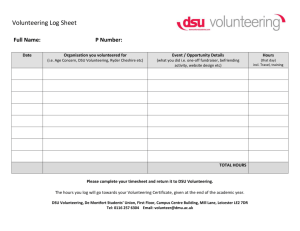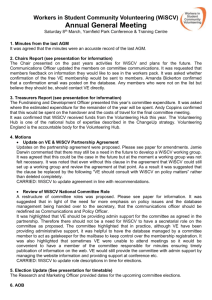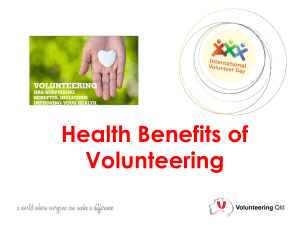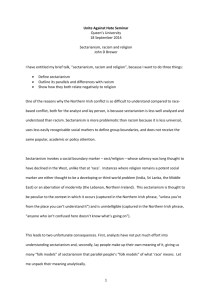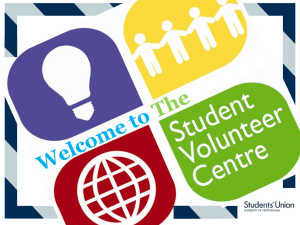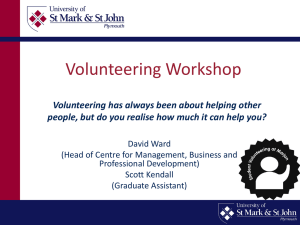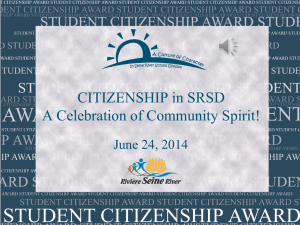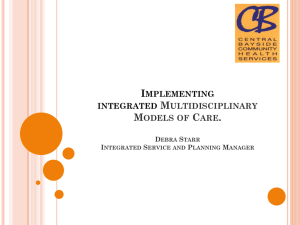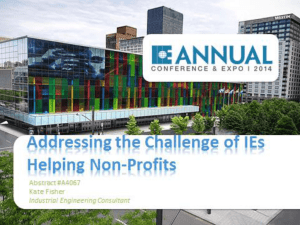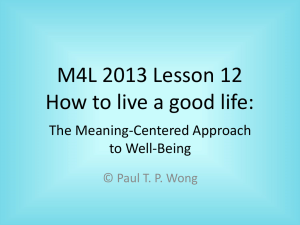United Youth Programme - Department for Employment and Learning
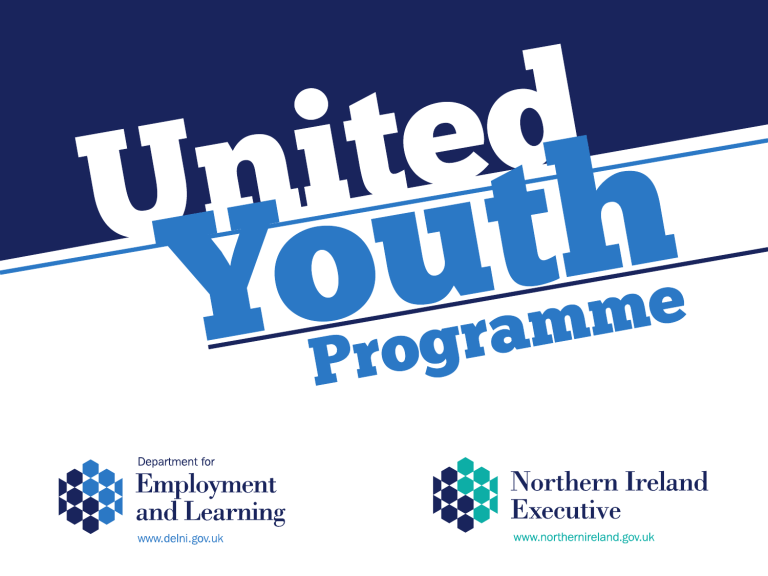
• Together: Building a United
Community is the NI Executive’s strategy for making progress on
Good Relations
• The United Youth Programme is one of the headline actions in the strategy
• 10,000 places for young people aged 16-24 years who are not in education, training or employment
• ‘Tackling sectarianism and racism at the very heart of its design’
From the Strategy – United Youth aims
• Support young people to take on new challenges and learn new skills
• Create strong and robust cross community bonds
• Create cross community trust and tackle misperceptions
• Divert them into constructive alternatives
• Give them training and experience in community and employment
• Facilitate them to meet new friends they would not have met otherwise
• Grow their confidence and CV
• Help the community
• Empower young people
• Support young people in identifying their role within society
• Help create responsible people
• Encourage volunteering
What young people and others have told us so far – for example....
• Put young people at the heart of the programme – a youth work approach
• A range of activities – e.g. music, sport, drama, travel, community volunteering, preparation for work
• Make it normal to meet new people
• No exams or academic pressure but yes to qualifications and good quality work experience
• Good quality one-to-one support
• Track progress and achievements
• Enough money to live on and address barriers like transport and childcare
• Progression focus, and support after the programme has ended
What will United
Youth look like?
• Several goals to think about
• Different types of activities already highlighted
• Youth work principles
• Duration / structure
– informed by pilots
Starting with young people aged 16-24 who are not in education, employment or training...
Away from home experiences
DISCOVER DEFINE Develop Deliver
• Together – government, service users and other interested stakeholders
• Bring all the relevant expertise to bear
• Should lead to different ways of doing things, allow us to keep learning, and lead to a better outcome
• The solutions come from the challenges
• Works hard to understand the realities of the user experience – the user is the expert on their experience
• Builds from the user / beneficiary perspective to define the ‘challenge’
• Identifies possible ways forward
• Tests possibilities on a small scale – pilot phase
• Captures the learning
• ‘Scales up’ and delivers
The process towards the pilots
• August – agreeing an outcomes framework to test
• September – call for concept proposals to test the outcomes
• October – concepts selected
• October / November – development phase including supporting events and activities
• December – pilots selected
• January – pilots announced and commence
An Outcomes Focus
Personal and related capabilities
Social / emotional / personal development / ‘soft skills’
Self-awareness and understanding
Confidence and agency
Communication
Planning and problem solving
Relationships including leadership
Creativity
Resilience, determination
Other relevant knowledge and skills for supporting own health and well-being
Citizenship – towards positive participation in family / community / society
Knowledge and understanding of own role in community / society
- for engagement with useful services
- for participation in community – structures, initiatives, democratic processes
- for service to the community / volunteering
- for positive family and community relationships
Good Relations – addressing community division / sectarianism / racism and contributing to reconciliation
Respect for diversity
Awareness of and sensitivity to the values, beliefs, customs and traditions of others
Understanding of own identity and respect for others from different community and cultural backgrounds, abilities, orientations etc.
Employability
Specific positive aspirations for education, training, work
Essential skills – literacy, numeracy, language, ICT
Other knowledge and skills for participation in learning, work experience, work
Attainment of qualifications that are appropriate and useful to the young person’s needs and progression
Using the capabilities
…during and beyond the programme
Positive engagement with useful services – e.g. advice
Positive participation in community – community, structures, initiatives, democratic processes
Positive participation in service to the community / volunteering
Positive family and community relationships
Positive engagement with others from a different community / cultural background – especially in the NI context
Positive engagement in education, training, work experience, work
Supporting own health and well-being
Personal and related capabilities
Social / emotional / personal development / ‘soft skills’
Self-awareness and understanding
Confidence and agency
Communication
Planning and problem solving
Relationships including leadership
Creativity
Resilience, determination
Other relevant knowledge and skills for supporting own health and well-being, including emotional health and well-being
Citizenship – towards positive participation in family / community / society
Knowledge and understanding of own role in community / society – individual / collective
- for engagement with useful services
- for participation in community – structures, initiatives, democratic processes
- for service to the community / volunteering
- for positive family and community relationships
Personal and related capabilities - continued
Good Relations – addressing community division / sectarianism / racism and contributing to reconciliation
Respect for diversity
Awareness of and sensitivity to the values, beliefs, customs and traditions of others
Understanding of own identity and respect for others from different community and cultural backgrounds, abilities, orientations etc.
Employability
Specific positive aspirations for education, training, work
Essential skills – literacy, numeracy, language, ICT
Other knowledge and skills for active participation in learning, work experience, work, including enterprise / entrepreneurship
Attainment of qualifications that are appropriate and useful to the young person’s needs and progression
Using the capabilities
…during and beyond the programme
Positive engagement with useful services – e.g. advice, support
Positive participation in community – community, structures, initiatives, democratic processes
Positive participation in service to the community / volunteering
Positive family and community relationships
Positive engagement with others from a different community / cultural background – cross-community (PUL / CNR) and crosscultural engagement
Positive engagement in education, training, work experience, work
Supporting own health and well-being, including emotional health and well-being
The Principles
1. Young-person-centred
The young person is at the centre when it comes to planning and delivering United Youth activities. They are actively engaged, the things that are important to them are taken into account and their experiences are used to support their learning. Taking part in
United Youth will be an enjoyable experience which fits with their life. How the young person feels is considered to be as important as what they know or what they can do.
2. Values and behaviours
Young people are reached out to and treated with empathy, respect, compassion, patience and the belief that they can grow and change.
3. Engagement with young people
Taking part in United Youth is not compulsory but helping young people engage is recognised as a task in its own right.
Young people will get the support that they need to take part – not just at the start but all along the way.
4.
The importance of a central positive relationship
The relationship between the young person and the person or people supporting them is vital. This relationship will be open and honest, rooted in a youth work approach, committed to nurturing the young person, and will create the conditions to help them flourish. It will provide ongoing opportunity for the young person to discuss their strengths, hopes, needs, issues, views, prejudices, to plan for the future, and will help them to stick with United Youth.
5. Voice
Young people will be supported to find their voice and to use it to influence their lives, and the lives of others, in a positive way.
They will also be supported to use their voice to help shape the
United Youth Programme.
6. Respect for difference
Respect for difference is a key part of United Youth. The programme will tackle sectarianism and racism, and other discriminatory and damaging attitudes and behaviours towards those who are perceived to be ‘different’. Young people will be supported to play their part in helping to address these issues.
Young people will learn from others from different backgrounds and from other experiences of difference that they have on the programme.
7. Safe and stimulating environments
United Youth will provide experiences which motivate young people and let them explore their hopes and fears in a safe environment, and ultimately move beyond their current horizons.
A young person will be enabled to design their own journey by setting personal goals and working out steps towards these goals.
They will be well supported to do this.
8. Partnership
Young people are partners in their learning and development.
People supporting them will work with them not ‘on’ them.
Other ‘partners’ who are important to the young person can also be involved – e.g. family members, peers, professionals. United
Youth will be mindful of, and seek to understand and work with, the wider context within which the young person lives their life.
The ‘non-negotiables ’
• Do No Harm!
• This is a ‘Good Relations’ programme
• This is a youth development programme and is young-person centred
• Willingness to work with us and others to drive our collective thinking towards a coherent United Youth programme
• Willingness to think ‘outside the box’ and help ‘raise the bar’
• Ambitious for the programme and for the young people who take part
• Clear focus on the outcomes and principles
• The relationship with the young person, referred to in the principles, must be evident
• Participatory approach – young people must be involved in the decisions that affect them and treated as fellow citizens – not something to be fixed or done onto
• Willingness to try out, test, explore
The information that we need
• Brief details on your organisation, contact details etc.
• If there are any other organisations to be involved that you know of at this stage, who they are
• Why you are interested in being part of this
• A description of your concept
• How you expect to recruit or engage with young people
• How you will involve young people in development and delivery
• Age range(s)
• How many young people
• Where your pilot will take place
• How long you think it will take
• Overall cost estimate and main areas of expenditure
The information that we will need – cont’d
• The quality systems, procedures and practices that will support your pilot
• Your understanding of the principles and how you will incorporate them and practise according to them
• How your concept will respond to the four outcome areas and how your approach will lead to change relating to these
• The skills of the people who will work with the young people
• Your thoughts on how what you are proposing will contribute to United Youth over the longer term – anything in particular you are exploring
• Short ‘public facing’ paragraph on your pilot to aid networking etc.
Pilots led by young people
• We are interested in engaging with one or more suitably skilled and experienced organisations to help us take this forward
• Youth-led means youth-led
• Submit your proposal using the same Concept Proposal form
• The detail will be around facilitating a process rather than taking forward a pilot per se
• Can take part in the ‘development events’ and / or other appropriate opportunities
• Can inform the work of others in the process
• Can inform the wider engagement process with young people that we need to establish
• Ideally a rural and an urban backdrop
What you need to do
•
Consider the challenge
•
Be prepared to explore with us and others
•
Complete a Concept Proposal template
•
Return to us by Thursday 25
th
September at
4.00pm
•
Can return electronically- preferred
•
Can return in hard copy
•
No additional information / attachments
What we will do
• The Design Team will consider all submitted proposals
• Select a number of proposals to go forward to a
Development Phase – October and November
• Let you know by week beginning 6 th October
-----------------------------------------------------------------------------------
If your concept proposal is selected, we…….
• Will offer a number of ‘development events’ during
October and November and invite you to take part in these
• Will provide more information on other details that we will need as you develop your full pilot submission
• Ask you for your full submission by 5 th December
• Let you know by 19 th December.
Development event themes....
- Design thinking, co-design and participation
- Our understanding of Good Relations and Good Relations practice
(including possibilities for links to other T:BUC strands)
- The core youth development approach
- Theory of change, quality of approach and measurement of change
- Active citizenship, community service, volunteering
- Preparation for work and work experience considerations
- ‘Away from home’ experiences
Thank you for taking part today
• Kieran McArdle - Tel. 028 90252248 email kieran.mcardle@delni.gov.uk
• Anne McCready - Tel. 028 90252375 or 07787408654 email: anne.mccready@sibni.org
